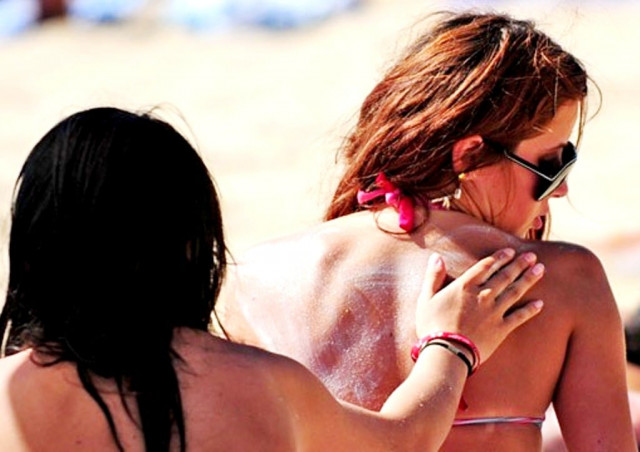Protect skin with sunscreen, but use lightly
Apart from skin cancer, sunscreens can also reduce vitamin D production.

Protect skin with sunscreen, but use lightly
"Sunscreen has its after-effects as the cream has harsh chemicals that can affect the body if not applied properly," Bangalore-based dermatologist Parveen Khurana told IANS.
"Zinc oxide, the must-have ingredient in sunscreens, can have harmful effects on the body if used frequently. Most girls today apply sunscreen every time they walk out from shade. This is a major concern," added Khurana.
According to research carried out at Missouri University of Science and Technology, one of the world's leading technological research universities, some compounds found in sunscreen can increase the rate of skin cancer if exposed to light.
"It is true that overexposure to sunlight without sunscreen can cause sunburns, discolouration and irritation. But we should not forget the fact that body also needs vitamin D for strengthening of bones," said skin expert Krishna Kumar.
"So apart from skin cancer, sunscreens can also reduce vitamin D production by as much as 97.5 to 99.9 percent. And interfering with your body's production of vitamin D may have dire health consequences," added Kumar.
Though many fear sun exposure, Kumar says it is important to spend some time in the sun sans sunscreen.
"Regular sun exposure can be harmful, but one can try sporadic sun exposure as getting into direct contact of sun also decreases the risk of melanoma (a more deadly form of skin cancer). So safe sun exposure, without any litmus shield like sunscreen, can help in getting away from skin cancer as well," he added.
So use sunscreen, but in a proper way, advise doctors.
Several beauty brands have recently launched different sunscreen-based creams with higher SPF (sun protection factor) count.
But according to Mumbai-based dermatologist Swati Srivastava, who works at wellness chain VLCC, there's hardly any difference in a sunscreen with an SPF count of 15 or 50.
"For Indian skin, any sunscreen containing SPF 15 and above is preferred. The difference between SPF 15 and 50 is minimal. Sunscreens with higher SPF ratings block slightly more UVB rays, but none offers 100 percent protection," she said.
How to pick the best sunscreen
"For dry skin, it is always advisable to use cream-based sunscreen. While in the case of oily skin, oil-free sunscreen lotion is preferred. For the people who live in the tropical areas, SPF 50 is recommended for outdoor use," said Chytra V. Anand, cosmetologist, Kosmoderma Skin and Laser Clinic, Bangalore.
There's no right age to apply sunscreen.
"There is no particular age group to apply SPF. In fact even kids are being recommended to use sunscreen to avoid sun damage at an early stage. Studies have shown that 90 percent of ageing is caused by sun damage. So sunscreen is the best anti-ageing cream.
"However, kids can use sunscreens with SPF 15-20 to avoid damage," added Anand.



















COMMENTS
Comments are moderated and generally will be posted if they are on-topic and not abusive.
For more information, please see our Comments FAQ